|
|
|
Sort Order |
|
|
|
Items / Page
|
|
|
|
|
|
|
| Srl | Item |
| 1 |
ID:
192318
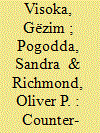

|
|
|
|
|
| Summary/Abstract |
In the face of the current decline or spectacular collapse of peace processes, this article investigates whether peace has become systematically blocked. It investigates whether the ineffectiveness of an ‘international peace architecture’ (IPA) can be explained by a more potent counterpeace system, which is growing in its shadow. It identifies counterpeace as proto-systemic processes that connect spoilers across all scales (local, regional, national, transnational), while exploiting structural blockages to peace and unintended consequences of peace interventions. It elaborates three distinct patterns of blockages to peace in contemporary conflicts across the globe: the stalemate, limited counterpeace, and unmitigated counterpeace. Drawing on the counterrevolution literature, this research asks: Have peace interventions become the source of their own undoing? Which factors consolidate or aggravate emerging conflict patterns? Are blockages to peace systemic enough to construct a sedimentary and layered counterpeace edifice?
|
|
|
|
|
|
|
|
|
|
|
|
|
|
|
|
| 2 |
ID:
192308
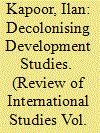

|
|
|
|
|
| Summary/Abstract |
This article explores ways of decolonising Development Studies by: (1) examining the discipline’s tendencies towards what some have called ‘imperial amnesia’, that is, proclivities towards disavowing if not erasing European colonialism, most evident in 1950s–1960s Modernisation theory, but also more recently in the work of such analysts as Bruce Gilley and Nigel Biggar; (2) considering the opportunities and perils of ‘epistemic decolonisation’, that is, ways of decolonising knowledge production in the discipline, including the limits of ‘non-Eurocentric’ pedagogies; and (3) reflecting on forms of material decolonisation (e.g., the reduction of socioeconomic inequalities by improving better access to education or resisting the corporatisation of publicly funded research) that need to accompany any epistemic decolonisation for the latter to be meaningful.
|
|
|
|
|
|
|
|
|
|
|
|
|
|
|
|
| 3 |
ID:
192307
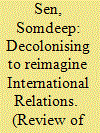

|
|
|
|
|
| Summary/Abstract |
Seeing as colonialism is ubiquitous to where International Relations (IR) comes from, what it explains and who it represents, many have argued that the decolonisation of the discipline is impossible. However, in this agenda-setting introduction, I place decolonisation squarely in the realm of possibility and ask, ‘what would a decolonised field look like?’. In answering this question, the contributions in this forum take point of departure from varied sites within the discipline, as they seek to materialise real change that reimagines what IR is and does as a discipline that was established as a scholarly defence for colonialism. Herein they propose decolonisation as a structure that upends the discipline’s colonial epistemological roots, rethinks core concepts and underlines the need to forefront geographies, peoples, and perspectives that were underrepresented in a colonial discipline. Equally, they recognise that decolonisation is a messy affair, that takes a non-linear trajectory. However, seeing as colonialism did not just inflict material impoverishment but also sought to alienate the colonised from their sense of self, this messiness is only expected. So, rather than be discouraged by this, this forum views the non-linear trajectory to be an unavoidable facet of any attempt at decolonising the discipline.
|
|
|
|
|
|
|
|
|
|
|
|
|
|
|
|
| 4 |
ID:
192311
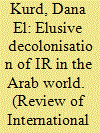

|
|
|
|
|
| Summary/Abstract |
Arab social science scholarship, and IR in particular, has been systematically underfunded and sidelined by governments across the region. As such, IR scholars in the Arab world have struggled to produce scholarship in hostile and authoritarian environments, let alone address efforts to decolonise. Of the few initiatives of indigenising social science that exist in the Arab world, the Doha Institute for Graduate Studies (DI) and its founding institution, the Arab Center for Research and Policy Studies (ACRPS), are the main examples. In this intervention, I will review the attempts to indigenise and decolonise IR within these institutions. I focus on how the DI is implementing three main approaches: increasing access to the discipline, rethinking how we teach IR, and facilitating theory production from the region. I demonstrate the strengths and weaknesses of the three abovementioned approaches by drawing attention to performative measures on the part of regional scholars, and pretending localism on the part of scholars in the Global North, which together help to perpetuate neomarginalisation. The shortcomings discussed permeate and distort attempts to decolonise the discipline within the Arab world.
|
|
|
|
|
|
|
|
|
|
|
|
|
|
|
|
| 5 |
ID:
192315
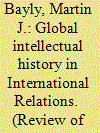

|
|
|
|
|
| Summary/Abstract |
The Eurocentric critique of the International Relations discipline has brought welcome attention to non-European international thinkers, and anti-colonial or anti-imperial thinkers in particular. Frequently these thinkers and associated movements are rightly described in thematic terms of emancipation, equality, and justice, in opposition to the hierarchical worldview of empires and their acolytes. Notwithstanding the broad validity of this depiction, a purely oppositional picture risks obscuring those aspects of ‘non-European’ international thought that evade simple categorisation. Drawing upon archival material and historical works, this article applies approaches offered by global intellectual history to the works of late colonial Indian international thinkers, exploring the mixed registers of equality and hierarchy, internationalism and imperialism present in their writings. Concentrating on three ‘sites’ connected by the common themes of diaspora and mobility: the plight of Indians overseas in East Africa; the concept of ‘greater India’; and the international political thought of Benoy Kumar Sarkar, the article complicates the internationalism/imperialism divide of the early twentieth century, showing how ostensibly opposed scholarly communities sometimes competed over similar forms of knowledge and ways of ordering the world. This offers a framework by which the contributions of global intellectual history can be applied to the study of international political thought.
|
|
|
|
|
|
|
|
|
|
|
|
|
|
|
|
| 6 |
ID:
192310
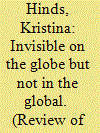

|
|
|
|
|
| Summary/Abstract |
Teaching and studying International Relations (IR) in the Caribbean makes the region’s invisibility unmissable. Nevertheless, these locales have significantly influenced the structure of global processes and are also acutely affected by global occurrences. Exposure to the global has led Caribbean scholarship to offer worthwhile insights into world affairs. Thinkers from the region and its diaspora provide noteworthy perspectives about the criticality of the Caribbean in building systems of empire and a world structured around race, class, and gender in ways that mainstream IR approaches may miss. This article takes its starting point as the Caribbean intellectual tradition. Grounding IR scholarship in this neglected, though highly pertinent, thought tradition is one angle from which to decolonise the discipline. The article connects these insights to an appraisal of a nimble strategy that Caribbean states and territories employ to navigate the global. The strategy of developing offshore financial centres (OFCs) can educate us about the functioning of the world if we are willing to think about it as embedded in global processes rather than as a problematic gimmick. In sum, this piece illustrates how using Caribbean thought and examining Caribbean global integration strategies can help to decolonise IR.
|
|
|
|
|
|
|
|
|
|
|
|
|
|
|
|
| 7 |
ID:
192319
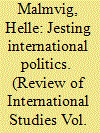

|
|
|
|
|
| Summary/Abstract |
Humour has recently emerged as an important research topic in International Politics. Scholars have investigated how states and state leaders practice humour as part of their diplomatic exchanges, in misinformation campaigns, and nation-branding. Important knowledge has been gained as to how humorous practices partake in constituting identities, managing recognition, and international anxieties or contesting global orders. Yet, little attention has been devoted to interrogating the risk that humorous practices may give rise to in international politics, to the underside of humour's productive power. This article aims to begin unpacking these risks both theoretically and empirically. To do so, it engages with the critical thinking on humour by Kierkegaard and Foster Wallace in particular, suggesting three challenging implications: (1) humorous entrapments; (2) facile forms of detached engagement; and (3) ambiguous blurring of fiction and reality. It then shows how these unfold empirically in: Iran's meme war with the US, a Yes Men's parody during COP15, and the Pyongyang Nuclear Summit, developing a three-pronged analytical strategy for studying humorous practices and their different relations to formations of power/knowledge.
|
|
|
|
|
|
|
|
|
|
|
|
|
|
|
|
| 8 |
ID:
192312
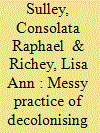

|
|
|
|
|
| Summary/Abstract |
This article1 explores the messy practice of decolonising a concept through collaborative work between scholars researching together the meaning of everyday humanitarianism in Tanzania. Humanitarianism is typically understood as the state-centric, formal, Northern-driven helping of distant others in crisis. Using the concept of everyday humanitarianism, our article challenges these assumptions in three ways. First, it explores the everyday humanitarian actions of ordinary citizens in times of crisis. Second, it explores these responses in a Southern context. Third, it focuses explicitly on the givers and not only the receivers of humanitarian help. Our work grounds decolonisation in the actual practices of research aimed at theory building as an iterative back-and-forth exchange with particular attention to power, rather than as a transplant of Northern theory on the South, or its opposite. Our first argument is that the objective of collaborative research to capture the local politics of giving and then use these practices to interrogate the theoretical concept of everyday humanitarianism can be decolonising. Second, we argue that the practices of the academic labour that produces knowledge or inductive theory can also be decolonising. Understanding both the challenges and the possibilities of decolonising ‘humanitarianism’ will provide an opportunity to document and thus legitimate the complexity that is inherent in decolonising a discipline.
|
|
|
|
|
|
|
|
|
|
|
|
|
|
|
|
| 9 |
ID:
192317
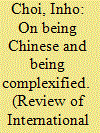

|
|
|
|
|
| Summary/Abstract |
While proponents of Chinese IR pursue a national school based on the identification of Chineseness with the Chinese national culture, its critics find a limited value in the ‘Chinese’ school as a mere temporary site for non-Western agencies. In contrast, I argue a distinctive and enduring Chinese IR is possible if it adopts a non-national and non-essentialised transcultural conception of Chineseness. This transcultural Chinese IR is based first on the contested and transcultural conception of Chineseness and second on the ontology of Chineseness as immanent humanity. Chineseness has been a fiction of a privileged descent from antiquity, which various contestants claimed by redefining the meaning of Chineseness. The shi elites, in particular, developed Chineseness as an aspirational ethos that propelled it to transcend its cultural boundary by incorporating foreign influences and thereby rendered Chineseness transcultural. Also, drawing on the ontological turn and Roy Wagner's work in anthropology, I show how Chineseness as immanent humanity transcends the category of culture, transforming the division of innate nature and constructed culture. The transcultural Chinese IR, with its own complexity and universal aspiration, uses its history and ontology to complexify both its tradition internally and other IR traditions externally, promoting the pluralisation of IR.
|
|
|
|
|
|
|
|
|
|
|
|
|
|
|
|
| 10 |
ID:
192309
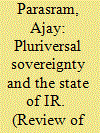

|
|
|
|
|
| Summary/Abstract |
IR proceeds on a Eurocentric ontological assumption that sovereignty has universal validity today. How can IR be decolonised, when in spite of countless examples of the enactment of ‘sovereignty otherwise’, the discipline remains unconcerned with the fact that the logic of sovereignty remains uni-versal. The question is as much political as it is intellectual, because as a discipline, we have allowed the inertia of our professional rhythms to marginalise pluri-versal sovereignty, or the organisation of sovereignty along different ontological starting points. I argue IR must abandon its disciplinary love affair with uni-versal sovereignty. The tendency to ‘bring in’ new perspectives by inserting them into an already ontologically constituted set of assumptions works to protect IR’s Eurocentricity, which makes disciplinary decolonisation untenable. I propose that as a starting point, IR needs to be more mature about recognising the decolonisations that are happening under our very feet if we are to stand a chance at disciplinary level decolonisation. As an illustrative example, I explore an ongoing collision of settler-colonial and Mi’kmaw sovereignty through the issue of lobster fisheries in Mi’kma’ki, or Nova Scotia as the territory is known to Canadians.
|
|
|
|
|
|
|
|
|
|
|
|
|
|
|
|
| 11 |
ID:
192313
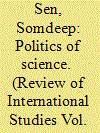

|
|
|
|
|
| Summary/Abstract |
This postscript deliberates the wider implications of decolonising the academy. It takes point of departure in the often-contentious public discourse on the topic and asks, why is the decolonisation agenda so concerning to public officials and the target of public policy? In many ways, derisive and irreverent responses to efforts to decolonise universities, schools, and the curricula is only expected seeing as it has the potential to disrupt the futures of the beneficiaries of colonial norms, practices, and institutions. But equally, the decolonisation agenda is contentious as it unsettles the assumption that scientific knowledge production is an apolitical affair. There are of course ample examples of scientific ‘progress’ being deeply indebted to histories and legacies of colonialism. However, it is in revealing this politics of science that decolonisation finds wider political relevance as not just an effort to recognise and remedy the legacies of colonisation in the academy. It also reveals the politics that is embedded in what we know and, in doing so, underlines the fallibility of a singular (scientific) frame, means of measurement, or rule of inference for understanding a social reality. In fact, decolonisation understood in this way is about opening up the possibility of acknowledging there isn’t a social reality. Every social phenomenon can be experienced in a multiplicity of ways and therefore reimagining IR in view of decolonising it requires a political response that empirically, methodologically, and theoretically forefronts the multiplicity of perspectives and experiences that have thus far been marginalised in the studying and understanding of social realities.
|
|
|
|
|
|
|
|
|
|
|
|
|
|
|
|
| 12 |
ID:
192314
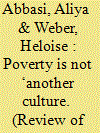

|
|
|
|
|
| Summary/Abstract |
Well-being and protection of all children have widely been associated with universal rights. Simultaneously, though, there is growing advocacy for a right of children to work to live. Drawing on cultural relativist premises, such advocacy strongly correlates with an acceptance of poverty as a condition that is inevitable or simply ‘given’. We advance an argument against a right of children to work to live. The fact that only poor children are compelled to work should direct analyses to the causes of poverty. A critical engagement with the politics of development is necessary as it is often constitutive of relations of impoverishment. We critique Eurocentric perspectives that advocate for child labour and substantiate our argument by drawing on the case example of Bolivia, which lowered the legal age for child labour, only to eventually retract this decision. We demonstrate the link between neoliberal development and a rapid increase in the number of children forced to work to live since the 1980s. The case for a right of children to work to live is not justifiable; but there is a case for abolishing child labour and upholding the right of all children and their families to live in dignity. Poverty is not ‘another culture’.
|
|
|
|
|
|
|
|
|
|
|
|
|
|
|
|
| 13 |
ID:
192316
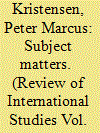

|
|
|
|
|
| Summary/Abstract |
This article contributes to the critical historical research that has demythologised the ‘noble origins’ of the International Relations discipline (IR) by exposing its imperial, colonial, and racist legacies. Where most critical historiographies have unveiled the centrality of racialised and imperialist ontologies in individual thinkers and theories, this article traces imperialist origins of international thought by reconstructing its impact on administrative-institutional infrastructures. Specifically, it interrogates the most systematic and institutionalised attempt to define the ‘subject matter’ of IR under the International Studies Conference (ISC) organised by the International Institute of Intellectual Cooperation (IIIC) of the League of Nations. Through a parallel reading of the archives from ISC's ‘administrative meetings’ and ‘study meetings’, the article contends that the seemingly academic discussions on the subject matter of IR in the ‘administrative meetings’ were in fact intertwined with the imperialist-colonial politics central to ‘study meetings’. The article thus not only challenges IR's conventional history, but its historical ontologies by revealing how race and empire were central to the constitution of its very subject matter and its early institutionalisation.
|
|
|
|
|
|
|
|
|
|
|
|
|
|
|
|
|
|
|
|
|